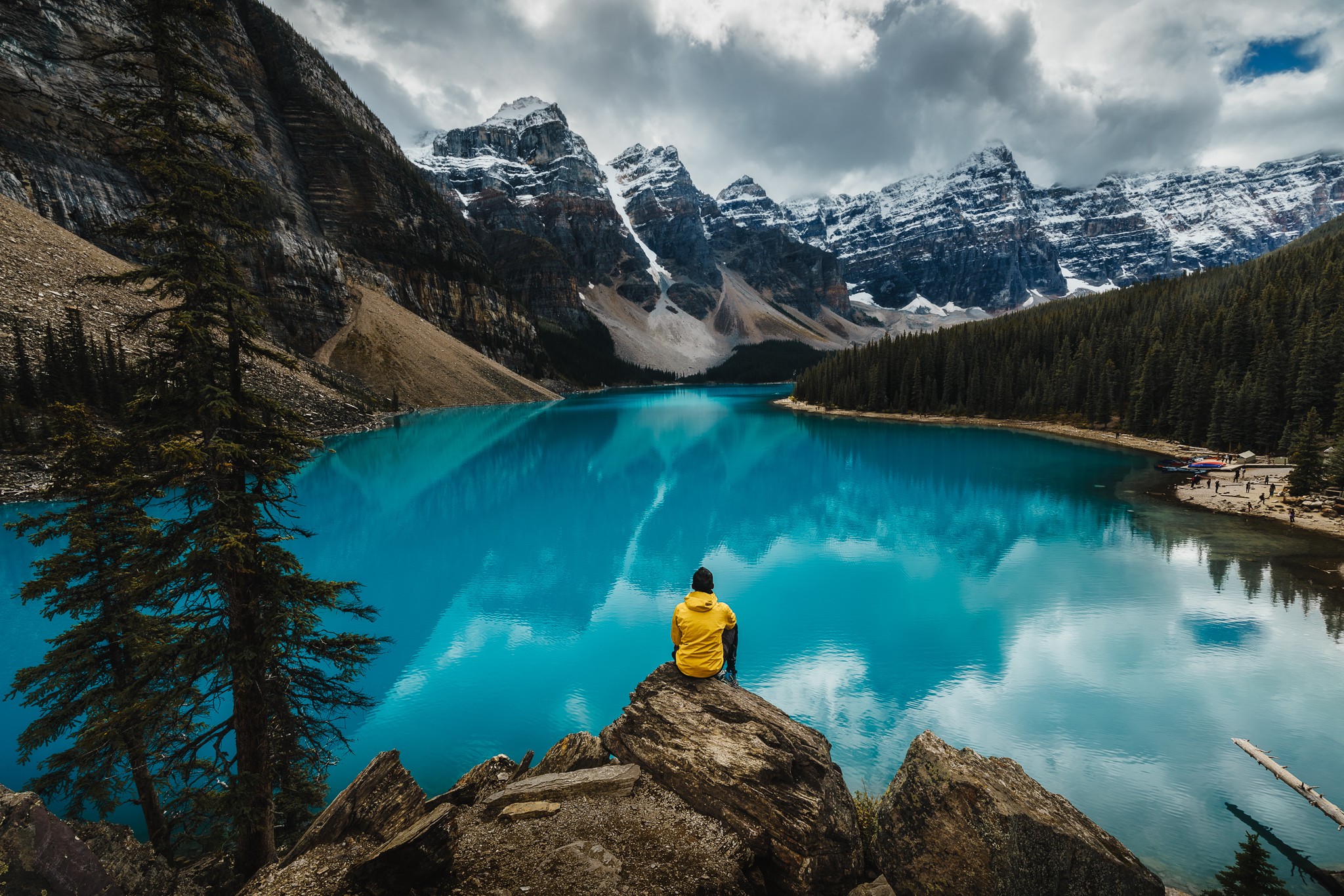At Moraine Lake, ten jagged peaks surround the turquoise blue waters as if they have crowned the lake as the Queen of the Canadian Rockies. The mountain tops cling to clouds for the fear of getting stripped naked in the public. I sit on top of a rock and take a deep breath. Space expands and things get quieter in my head. I am in the company of trees, rocks, and grass as we all look in amazement at the magnificent beauty we behold before us. We all become eyes only. There is no past. There is no future. It is just one single moment stretched to infinity in which we all dance in silence on the drumbeat of my heart.
The mother natures marvels on us. The sun takes a peek through the clouds. The newly born shadows begin to crawl and then stand up and dance with us, hiding, revealing, and making funny shapes. Soon the whole universe is dancing in unison with us, the air, the mountains, the water, and the spirits of our ancestors.
“Wooho!!!!!!” I shout with excitement. Suddenly, the music stops. The sun pulls the curtain of clouds on its face and I am kicked out of the dance celebrations. Right when I was about to take the first sip of true happiness, I spilt the drink.
My mind slowly wakes up and realises what had gone under its radar. I begin to wonder the question: “what is happiness?”
Is happiness becoming free of pain and worries? Does it come as a continuous stream of joy, when you are living a dream life, or as blips of pure bliss? Is it a stage, where every moment is filled with contentment, or a state, where intense moments of joy precede and succeed misery? Is it the joy of following your own path alone despite facing the adversity from others, or taking the same road every day to be with a family and retain a sense of belonging to a community? Is true happiness devoting your life to the noble cause and living for others? Is it when the world applauses you on your accomplishments or when you sit on top of the rock in silence and no one in the world knows about you?
Aristotle was the first one to make a distinction between different kinds of happiness. He classified them into two categories. The hedonic happiness which is derived from pleasure, and the eudaemonic happiness which is derived from well-being.
Hedonic happiness is derived from bodily pleasures which can be felt using five senses. It is about short-term experiences. It can be tasting a delicious meal, smelling the sweet fragrance of a perfume, watching a movie, listening to music, taking drugs, having sex, gambling, going out on an adrenaline-filled adventure, or a crazy night out with friends. The happiness derived from these activities soon wears off leaving us empty and unfulfilled inside. To fill the vacuum, we venture into yet another hedonic experience, albeit more intense one.
Success, fame, and wealth are hedonic too. The happiness derived in a worldly manner is short lived. There is always someone ahead of us whom we want to beat. The growing competition and jealousy are the main reasons for our unhappiness today. Besides, when our wealth increases so do our needs. After a certain point, the wealth doesn’t make a difference in happiness, but we continue to work harder to be able to afford more luxuries in the hope they would make us happy. The vicious cycle of system sucks us in as we try to keep up the tempo with others. In the end, we standing on the losing side as we have lost the most precious thing we have in this life: time.
Another irony with the hedonic happiness is that if you are not happy without something, you will not be happy with it. Material possessions and hedonic activities lead to a pleasure, but not necessarily to true happiness. Diener described the hedonic happiness as Subjective Well-Being (SWB). It is about me as an individual.
On the other hand, eudaemonic happiness refers to true happiness derived from living a virtuous life and is linked it to the fulfilment of the soul. Professor, Carol Ryff described eudaemonia as Psychological Well-Being (PWB). She concluded that psychological well-being has to do with six components — self-acceptance (positive attitude towards the self), positive relations with others, autonomy (being independent), environmental mastery (ability to manage the surrounding environment), purpose in life, personal growth (feeling of continued self-development). PWB goes beyond me and adds generosity, friendship, and justice towards others. Exercising these virtues in life can lead a person to true happiness.
According to Aristotle, happiness is the ultimate goal of human existence.
How can we reach this goal then? There is no direct route to happiness which we can aim. The shortcut route will only bring us to hedonic pleasures. In today’s society, we have become addicted to instant gratification, but feeling good is not enough in life. We will remain hollow from inside.
I believe the purpose of life is to fulfil your potential and reach self-actualisation. It is only through justifying our existence that we can unearth the source of true happiness within ourselves. Through contemplation, strong determination towards the goal, faith in own abilities, good intentions towards others, everyone can take on this long arduous journey towards happiness. It doesn’t have to be one giant leap, it can be one pedal at a time, like in my case.
Back at the Moraine Lake, I look at the trees for their affirmation. They continue to sway silently, looking satisfied, not bothered by my thoughts. I close my eyes, take a deep breath, and disappear; becoming the wind circling in the sky, kissing the snowy peaks, and creating ripples in the lake!



